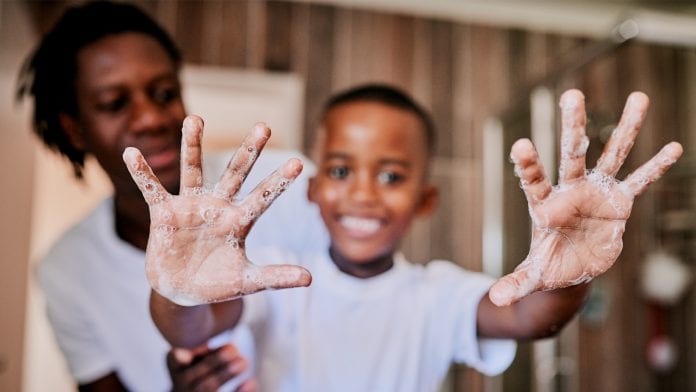
A new survey has revealed that almost half of children aged five to 10 years old are not practising proper hand hygiene by using soap when washing their hands at school.
The survey, conducted by The Global Hygiene Council (GHC), has found how 42% of children are not following proper hand hygiene procedures in school by using soap when they wash their hands. It assessed primary school children’s hygiene awareness and habits across seven countries during COVID-19 and, in all countries, usage of soap was higher at home than in school settings.
Leading hygiene experts are now stressing the importance of effective hand hygiene measures and education in schools as children begin returning to educational settings following the COVID-19 pandemic.
Hand hygiene
The survey showed that at schools, less than half of children (44%) said that someone ensures they always wash their hands prior to eating, with the vast majority (71%) stating this happens at home.
Commenting on the survey findings of Infectious Diseases at Washington University School of Medicine in St. Louis said: “As children slowly begin returning to schools around the world, the focus on improved hygiene should not just be a short-term measure.
“Whilst COVID-19 has increased public awareness of the importance of hand hygiene in stopping the spread of respiratory infections, basic hygiene measures such as handwashing are also essential in preventing the spread of common illnesses including gastrointestinal infections, such as diarrhoea.”
Controlling infections in school settings
The experts emphasised the importance of supplying schools with hand soap, as on average, only 60% of children stated that soap was always available in school settings, with one in 10 stating that soap was never available.
Schools are places where infections can easily spread, and the adoption of a targeted hygiene approach offers a way to maximise protection against this.
A recent paper, published in the American Journal of Infection Control, highlighted that improved everyday hygiene practices, such as hand-washing, reduces the risk of common infections by up to 50% and the need for antibiotics by up to 30%.
Studies in school settings with appropriate hand hygiene, in combination with surface disinfection, have indicated a positive impact on illness rates.
Professor Sally Bloomfield from the London School of Hygiene and Tropical Medicine said: “Targeted hygiene means focussing hygiene practices in places and at times – known as ‘risk moments’ – when harmful microbes are most likely to spread. The key risk moments at schools include food handling, using the toilet and touching surfaces frequently touched by others.”
Dr Gandra added: “Whilst the majority of children may know that they should be washing their hands, many are not actually putting it into practice, so there is a clear gap in educating them about the importance of handwashing.”
“It is essential that healthy hygiene habits, such as washing hands for 20 seconds with soap and water, are ingrained into the next generation to help prevent the spread of future outbreaks and to protect families from other common infections.”










